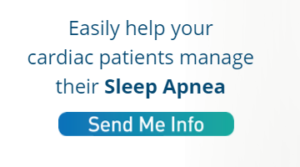
By Gilad Glick | August 16, 2017
February was Heart month, and the national Healthy Sleep Project launched the “Sleep Apnea Hurts Hearts” campaign in collaboration with the American Academy of Sleep Medicine (AASM), the Centers for Disease Control and Prevention (CDC) and the Sleep Research Society (SRS). The campaign intended to raise awareness and urge individuals with symptoms of Sleep Apnea to talk to a doctor about their risk.
Cardiovascular comorbidities of Sleep Apnea have been known for a long time. Sleep apnea affects about 50% of heart patients on average (higher for certain conditions)1. Sleep Apnea has been linked to drug-resistant hypertension, Coronary Artery Disease, Heart Failure, Diabetes, Atrial Fibrillation and other Arrhythmias, Stroke and even depression. However, the CVD outcomes following proper Sleep Apnea treatment have only been studied in the past 5-10 years. And, the initial results are significant.
Yet, systematic screening and integration of Sleep Apnea management into the continuum of cardiac care is just at its infancy.
However, recently we have seen a clear momentum from the cardiac establishment endorsing this need. In September 2016, The American Heart Association (AHA) released a scientific statement on sleep duration and quality, which stated that moderate and severe Sleep Apnea were associated with a substantially higher risk of cardiovascular disease2. The authors of the AHA statement recommended that a public health campaign addressing sleep behavior should be launched to promote ideal cardiac health.
At the same time, the European Society of Cardiology (ESC) published revised guidelines for the management of Atrial Fibrillation including a clear call that “Interrogation for clinical signs of Obstructive Sleep Apnea should be considered in all AF patients. Obstructive sleep apnea treatment should be optimized to reduce AF recurrences and improve AF treatment results”.3
Right after that, the ACC came out during their annual meeting in March 2017 with a special editorial Sleep Apnea: Types, Mechanisms, and Clinical Cardiovascular Consequences calling all Cardiologists to consider Sleep Apnea as modifiable cardiovascular risk factor4.
Our vision with Cardio Sleep Solutions
Our vision at Itamar Medical is to be the world leader in providing complete Sleep solutions to all Cardiologists and their heart patients. We are passionate about the integration of Sleep medicine in cardiology care pathway by providing simple, timely and tailored solutions, that actually work.
As more and more cardiologists realize the importance of sleep to their success, and look for ways to improve outcomes, patient experience and quality of care, I invite you to join us and test our Cardio-Sleep Solutions to improve not only your patients’ heart health, but also every aspect of their lives and overall wellbeing.

1 Seet & Chung, Anesthesiology Clinical 2010
2 St.-Onge et al, Sleep Duration and Quality: Impact on Lifestyle Behaviors and Cardiometabolic Health: A Scientific Statement From the American Heart Association Circulation Sept 2016
3 Benussi et al, 2016 ESC Guidelines for the management of atrial fibrillation developed in collaboration with EACTS, European Heart Journal (2016) 37, 2893–2962
4 Javaheri et al, Sleep Apnea: Types, Mechanisms, and Clinical Cardiovascular Consequences J Am Coll Cardiol. 2017;69(7):841-858.
